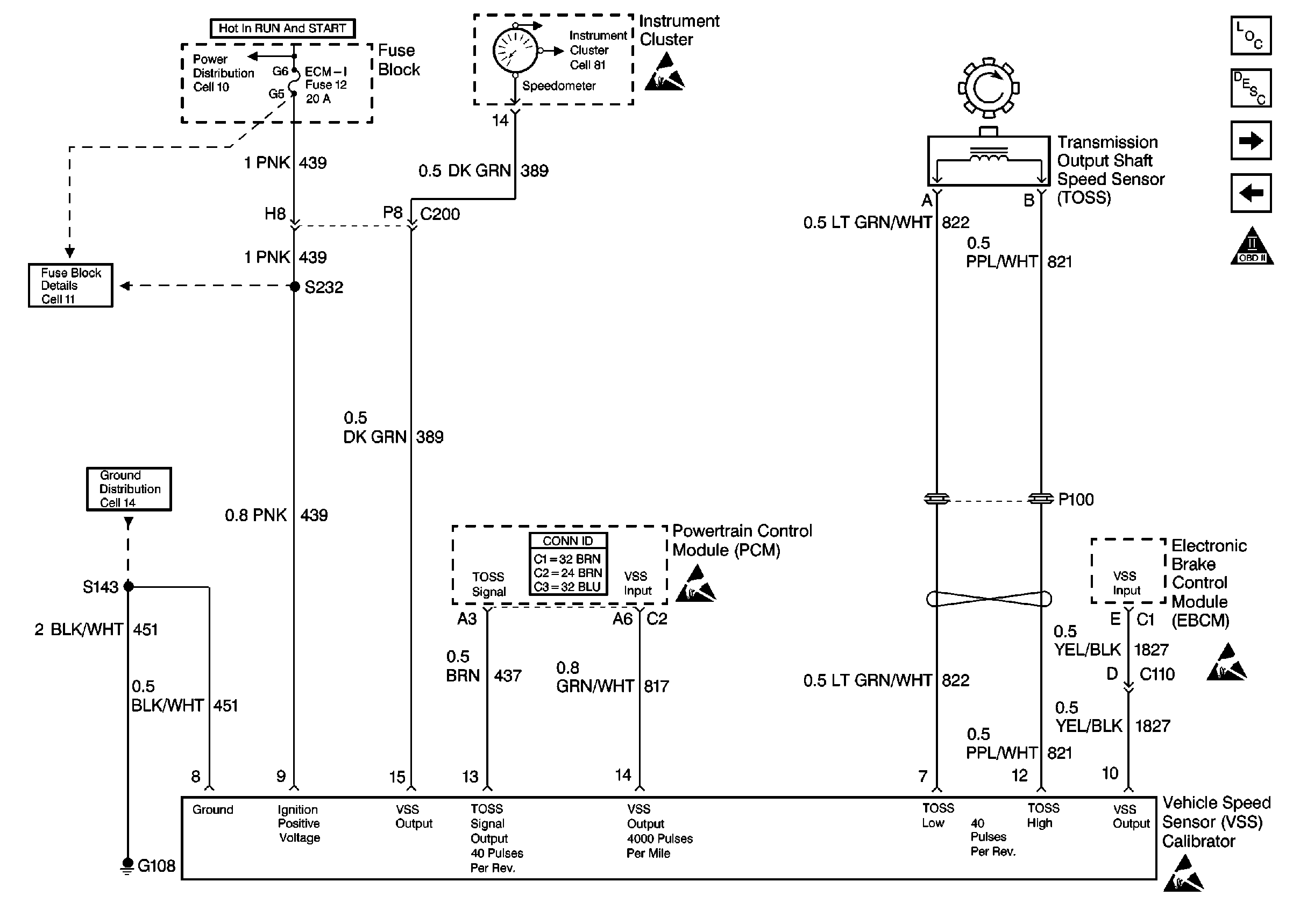Go to
Cell 22: VSS Circuit

.
Circuit Description
The speed sensor circuit consists of a magnetic induction type sensor, a vehicle speed sensor buffer module and wiring. The gear teeth pressed on the output shaft induces an alternating current in the sensor. This signal is transmitted to the buffer. The buffer compensates for various axle ratios and converts the signal into a square wave for use by the speedometer, the cruise control, the antilock brake and the PCM. The buffer sends two different signals to the PCM.
Conditions for Running the DTC
| • | The vehicle speed is greater than 20 mph. |
| • | Four wheel low is not selected. |
Conditions for Setting the DTC
| • | The VSS buffer calculated speed is greater than the transmission calculated speed by 20 mph. |
| • | All of the conditions must be met for 2 seconds. |
Action Taken When the DTC Sets
| • | The PCM will not illuminate the malfunction indicator lamp (MIL). |
| • | The PCM records the operating conditions at the time the diagnostic fails. This information is stored in the Failure Records. |
Conditions for Clearing the MIL/DTC
| • | A History DTC will clear after forty consecutive engine warm up cycles, if this or any other emmision related diagnosic does not report any failures. |
| • | Use of a scan tool will clear the DTC codes. |
Diagnostic Aids
Check the connections at the VSS buffer and the PCM. Refer to 4L80E Diagnostic Trouble Codes if DTC P0722 or DTC P0723 are also set.
Test Description
Number(s) below refer to number(s) on the Diagnostic Table.
-
This tests for B+ at VSS buffer.
-
This tests for proper ground path for vehicle speed sensor signal buffer.
Step | Action | Value(s) | Yes | No |
|---|---|---|---|---|
1 |
Important: Before clearing any DTCs, use the scan tool Capture Info to save the Freeze Frame and Failure records for reference. The control module's data is deleted once the Clear Info function is used. Did you perform the Powertrain On-Board Diagnostic (OBD) System Check? | -- | ||
2 |
With the drive wheels rotating, does the vehicle speed increase with drive wheel speed increase? | -- | ||
Is the test lamp ON? | -- | |||
Back probe the VSS buffer module ignition feed circuit to the ground circuit with an J 35616-200 unpowered test lamp. Is the test lamp ON? | -- | |||
5 |
Does the voltage increase on the J 39200 DMM with drive wheel increase? | -- | ||
6 | Does the scan tool display a trans output speed (MPH) increase with drive wheel increase? | -- | ||
7 | The DTC is intermittent. If no additional DTCs are stored, refer to Diagnostic Aids. If additional DTCs are stored refer to those table(s) first. Are any additional DTCs stored? | -- | Go to the applicable DTC table | Go to Diagnostic Aids |
8 | Repair the open in the ignition feed circuit. Is the action complete? | -- | -- | |
9 | Repair the open in the ground circuit. Is the action complete? | -- | -- | |
10 | Check the complete VSS input circuit for an open or short to ground. Refer to Wiring Repairs . Did you perform a repair? | -- | ||
11 |
Did you find a problem? | -- | ||
12 |
Is there voltage present? | -- | ||
13 | Check the VSS output circuit for an open or short to ground. Refer to Wiring Repairs . Did you perform a repair? | -- | ||
14 | Check VSS output circuit for a proper connections at the PCM. Refer to Wiring Repairs . Did you perform a repair? | -- | ||
15 | Replace the Vehicle Speed Sensor. Is the action complete? | -- | -- | |
16 | Replace the VSS Buffer module. Refer to Vehicle Speed Signal Buffer Replacement . Is the action complete? | -- | -- | |
17 |
Important: The new PCM must be programmed. Refer to Powertrain Control Module Replacement/Programming . Replace the PCM. Is the action complete? | -- | -- | |
18 |
Does the scan tool indicate the diagnostic Passed? | -- | ||
19 | Does the scan tool display any additional undiagnosed DTCs? | -- | Go to the applicable DTC table | System OK |
